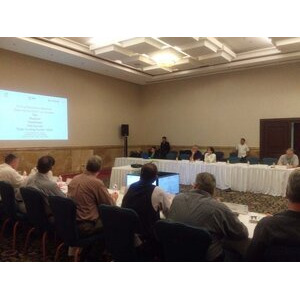Merida, Yucatan, Mexico – Texas A&M Delegation visits Yucatan to discuss the projects related to the second phase of the Yucatan Initiative, Agriculture and Life Sciences. In total 16 researchers of different areas from TAMU, participated in this workshop to complete the objectives as marked in the agenda of this binational collaboration.
The goal of the first working session was for all participating experts from TAMU and SIIDETEY to introduce themselves and to present key research projects and interests regarding the projects considered in Agriculture and Life Sciences: Animal Science / Agro-biodiversity, Horticulture / Water Quality, Food Science- Nutraceuticals / e-beam, and Aquaculture / Shrimp Genomics. At the same time, the experts had the opportunity to visit the current research centers and experimental units in which work is being carried out in each of these areas: Autonomous University of Yucatan School of Veterinary Medicine (UADY) and the Yucatan Science and Technology Park Seed Factory as well as a cenote visit.
Subsequently, a meeting on E-beam Technology was held to discuss about the installation in Yucatan of the electron beam radiation technology. E-beam technology can be implemented in medical and industrial products, foods, and in the environment, it also has the potential to develop e-beam-based healthy and environmentally sustainable vending machines which represent a growing industry of approximately $45 billion dollar in the USA.
In this meeting participated, Ernesto Herrera Novelo, Secretary of Economic Development for the State of Yucatan, Juan José Canul Pérez, Secretary of Rural Development for the State of Yucatan, Raúl Godoy Montañez, Secretary of Research, Innovation and Higher Education for the State of Yucatan, Xavier Chiappa Carrara, General Coordinator of UNAM’s Sisal Academic Unit, Antonio Capella, from the National Autonomous University of Mexico, and Alan Sams, Boon Chew, Suresh Pillai, and Zenon Medina-Cetina from TAMU.
To close up with a successful workshop, the groups of experts integrated from both institutions, presented their research ideas for the previously mentioned projects. The Yucatan Initiative intends to integrate knowledge to approach and solve regional problems that will benefit both States.
Jointly, a second workshop is being planned to present white papers to be considered for a matching fund one-year program.There is active collaboration and research being done to carry out these projects as part of the second phase of the Initiative.


